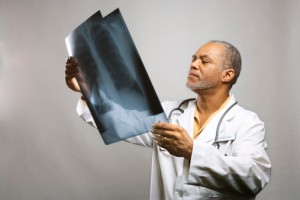

 Osteomyelitis, staph bone infection, may be treated with a new model discovered in previous research. Osteomyelitis is an infection of the bones caused by Staphylococcus aureus, which reaches the bones through the bloodstream or nearby tissue. If the bone itself is permeated by germs, it can become infected.
Osteomyelitis, staph bone infection, may be treated with a new model discovered in previous research. Osteomyelitis is an infection of the bones caused by Staphylococcus aureus, which reaches the bones through the bloodstream or nearby tissue. If the bone itself is permeated by germs, it can become infected.
Adults are more likely to develop osteomyelitis in the bones that make up the spine, and diabetics can develop it in their feet bones if they have pre-existing ulcers.
Osteomyelitis used to be an incurable condition, but modern medicine is able to treat it. In some cases, surgery may be required to remove the infected bone, followed by antibiotics to aid in treatment.
 Previous research found a new form of treatment for osteomyelitis that involves testing with a new mouse model. Researcher Dr. James Cassat developed micro-computed tomography (micro-CT) imaging technologies to visualize a surgically induced bone infection.
Previous research found a new form of treatment for osteomyelitis that involves testing with a new mouse model. Researcher Dr. James Cassat developed micro-computed tomography (micro-CT) imaging technologies to visualize a surgically induced bone infection.
“The micro-CT gives excellent resolution images of the damage that’s being done to the bone. We found that staph is not only destroying bone, but it’s also promoting new bone growth. Staph is causing profound changes in bone remodeling,” said lead researcher Eric Skaar, Ph.D.
“We’re not aware of any other bone infection models where you can pull the bacteria out of a bone and count them in a highly reproducible manner. From a therapeutic development standpoint, we think this model is going to allow investigators to test new compounds for efficacy against bone infections caused by staph or any other bacteria that cause osteomyelitis,” added Skaar.
The use of the model allowed researchers to demonstrate a certain protein secreted by staph, which plays a role in osteomyelitis. Understanding bacterial factors could help researchers develop new and more effective treatments.
 Osteomyelitis is commonly caused by the bacteria Staphylococcus aureus, or staph infection. The bacteria travel through the blood stream or get to the bone through surrounding tissue, which causes the infection. Pneumonia, an abscess tooth or even a urinary tract infection can all lead to osteomyelitis.
Osteomyelitis is commonly caused by the bacteria Staphylococcus aureus, or staph infection. The bacteria travel through the blood stream or get to the bone through surrounding tissue, which causes the infection. Pneumonia, an abscess tooth or even a urinary tract infection can all lead to osteomyelitis.
Symptoms of osteomyelitis can vary, beginning with pain, difficulty or inability to use the affected limb or hold or apply weight to the affected limb due to increased pain.
Some symptoms occur rapidly and others may appear gradual; a fever may develop along with chills, irritability, swelling or redness, stiffness and nausea.
There are two types of osteomyelitis: acute and chronic. In acute osteomyelitis symptoms are sudden and in chronic the symptoms appear gradually and may reoccur even when treated with antibiotics.
Osteomyelitis is avoidable, but there are certain conditions and factors that increase a person’s risk of developing it. Risk factors of osteomyelitis include:
If osteomyelitis is not properly treated, it can lead to complications including the following:
 There are many treatment options available in order to treat osteomyelitis. Some of those treatments include antibiotics administered intravenously, or surgery to remove any dead bone. If osteomyelitis occurs after a joint replacement, the replaced joint may need to be removed and a new one must be used.
There are many treatment options available in order to treat osteomyelitis. Some of those treatments include antibiotics administered intravenously, or surgery to remove any dead bone. If osteomyelitis occurs after a joint replacement, the replaced joint may need to be removed and a new one must be used.
Prevention techniques include properly cleaning any open skin wounds right away, wearing proper footwear to avoid injury and preventing other infections that can increase the risk of staph infections. This means always properly washing your hands as well as cooking food properly.
As osteomyelitis may have many serious complications attached to it, it is best you do your part in preventing it at all costs.
Eat these foods for strong bones
For as long as you can remember, you have been told that calcium and milk products are what it takes for strong and healthy bones. Although this isn’t completely false, it’s not the complete truth either. Bones are made up of many different minerals that work together to keep them strong and help them absorb calcium. Continue reading…
Bone loss linked with serious illness
A new study found that serious illness could contribute to bone loss. The research consisted of 66 seniors who spent 24 hours on a breathing machine in the intensive care unit (ICU). After one year of hospital stay the patients had 1.6 percent less bone density in their lower spines and 1.2 percent less bone density in their thigh bones. Continue reading…
Copyright © www.orthopaedics.win Bone Health All Rights Reserved